[ad_1]
About eight years ago, in response to customer concerns about possible health risks associated with aspartame, an artificial sweetener, PepsiCo decided to remove the ingredient from its popular diet soda.
Sales flopped. A year later, aspartame was back in Diet Pepsi.
Today, the three main ingredients listed in the small print on the back of cans and bottles of Diet Pepsi – and its competitor Diet Coke – are water, caramel color and aspartame.
A trip to the grocery store reveals the ingredient on the labels of not only diet sodas, but also diet teas, sugar-free gummies, sugar-free energy drinks and diet lemonade drink mixes. According to some estimates, thousands of products contain aspartame.
The use of aspartame, often known by the brand name Equal, in food and beverage products has long been the subject of intense scrutiny. The latest iteration came on Thursday, when an agency of the World Health Organization said aspartame could possibly cause cancer and encouraged people who consume a significant number of drinks containing aspartame to switch to water or other unsweetened beverages.
But even with the emergence of many new artificial sweeteners, as well as those made from plants and fruits, Big Food just can’t stop aspartame, and analysts aren’t expecting it just yet. That’s because the ingredient is one of the cheapest sugar alternatives to use, it works especially well in drinks and mixes, and people love its taste.
There were also backlash over the urgency of the WHO announcement. In a quick rebuke, the US Food and Drug Administration said it disagreed with the findings, reiterating its position that aspartame is safe. And a second WHO committee said a 150-pound person would have to drink more than a dozen cans of Diet Coke a day to exceed the safe threshold for the sweetener.
“Major beverage companies have been contingency planning for months, experimenting with different sweeteners, in an effort to make the taste and quality of diet drinks as consistent as possible with existing products,” Garrett said. Nelson, which covers the beverage industry. at CFRA Research. But they likely won’t change the recipe unless they see a significant drop in consumer demand based on the WHO report, he said.
“If consumers really stop buying Diet Coke because of this report, if sales start to suffer, it might be time to switch to plan B,” Nelson said.
Coca-Cola referred the questions to the American Beverage Association, the industry’s lobbying arm. “Aspartame is safe,” Kevin Keane, the organization’s acting president, said in a statement.
PepsiCo didn’t respond to questions for comment, but in an interview with Bloomberg Markets that aired Thursday, Hugh F. Johnston, PepsiCo’s chief financial officer, said he didn’t expect a big reaction from consumers.
“I believe that in fact this will not be a significant issue for consumers based solely on the preponderance of evidence suggesting that aspartame is safe,” Johnston said.
The WHO agency’s assessment adds to consumer confusion around aspartame, but it’s also the latest in a recent spate of research focusing on potential risks and questioning the true benefits of aspartame. artificial sweeteners. Just a few weeks ago, the WHO not recommended using artificial sweeteners for weight control, saying a review of studies showed no long-term benefit in reducing body fat in children or adults. The review also suggested that sweeteners were linked to an increased risk of type 2 diabetes and cardiovascular disease.
This year, researchers from North Carolina State University and the University of North Carolina at Chapel Hill published a study who found a chemical formed after digestion of another sweetener, sucralose, breaks down DNA and may contribute to health problems.
For years, food and drink companies and regulators have generally denounced research that raises questions about artificial sweeteners, widely claiming that the studies were flawed or inconclusive or that the health risks were miniscule.
“A substantial body of scientific evidence shows that calorie-restricted and calorie-free sweeteners offer effective and safe options for reducing sugar and calorie intake,” Robert Rankin, chairman of the Calorie Control Council, the lobbying association for manufacturers and suppliers of nearly two dozen alternative sweeteners, said in an emailed statement Thursday.
Indeed, most food companies that use aspartame are reluctant to switch in part because aspartame is cheaper than other alternatives and is 200 times sweeter than sugar, which means a little is enough.
“One of the great things about aspartame is that it’s been around for so long that the manufacturers have really honed in on the cost and the processing and they’re getting a premium product,” said Glenn Roy, assistant professor. of organic chemistry at Vassar College. more than three decades working in food companies including NutraSweet, General Foods and PepsiCo.
On top of that, the FDA approved aspartame in 1974, giving companies decades of data and information on what aspartame can and can’t do in products. For example, it can enhance and extend certain fruit flavors, such as cherry and orange, making it a preferred sweetener for beverages and chewing gum. But when heated, aspartame loses its sweetness, making it less desirable for baked or cooked products.
Food and beverage companies are introducing new sugar-free or low-sugar products in response to consumer demand, but many are made with new sweeteners or a blend of sweeteners. Each new product undergoes a litany of sensory and taste tests before release.
But for products that have been around for decades, like diet sodas, loyal customers are used to a specific taste, and they could be put off by ingredient changes, scientists warn.
[ad_2]
Source link
